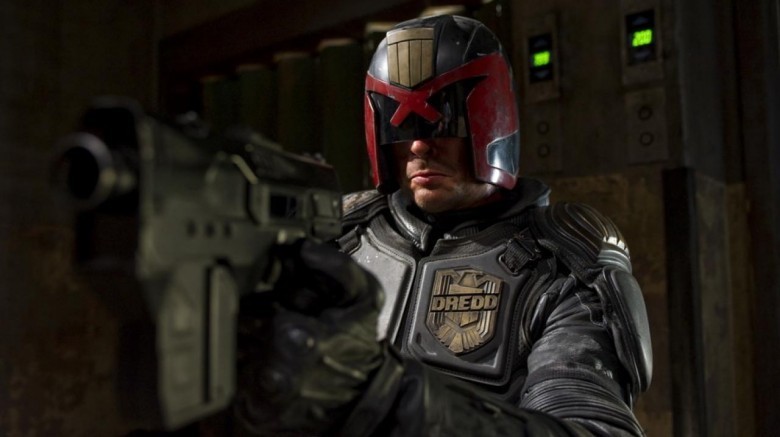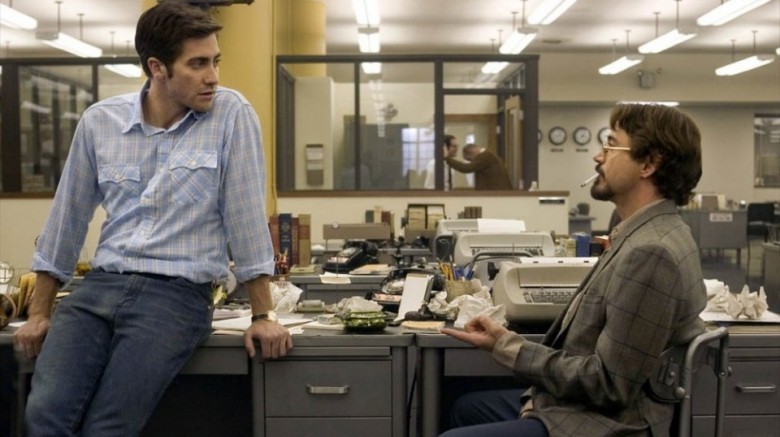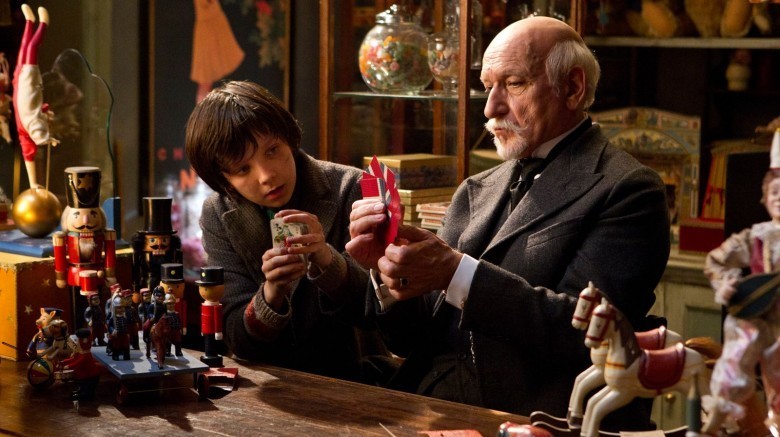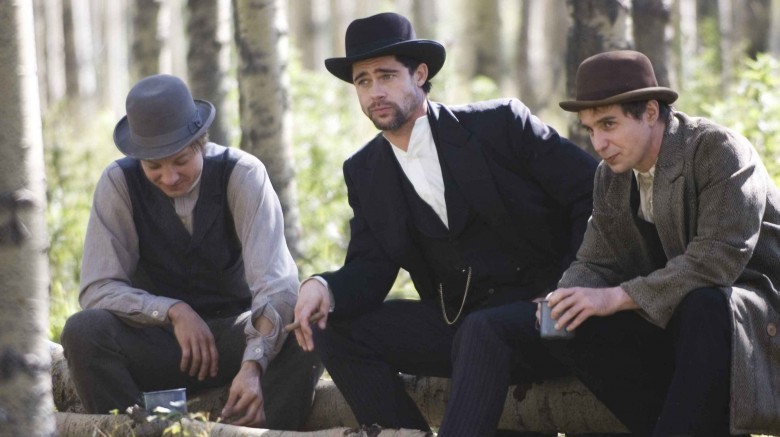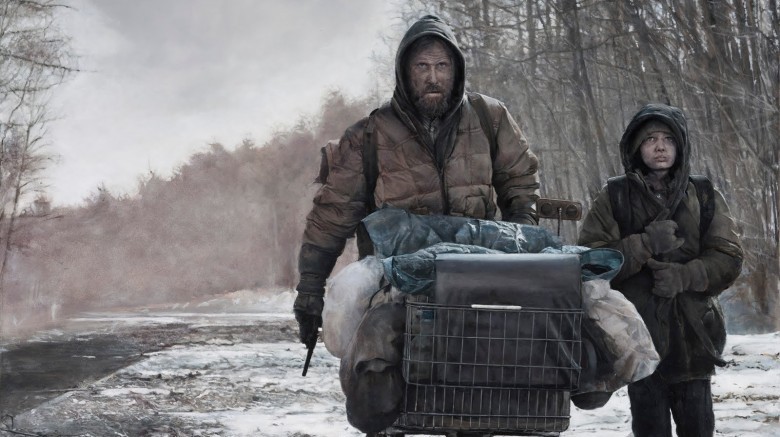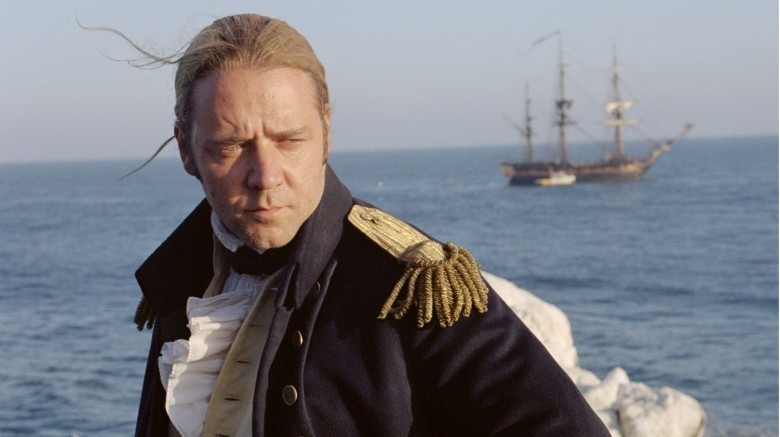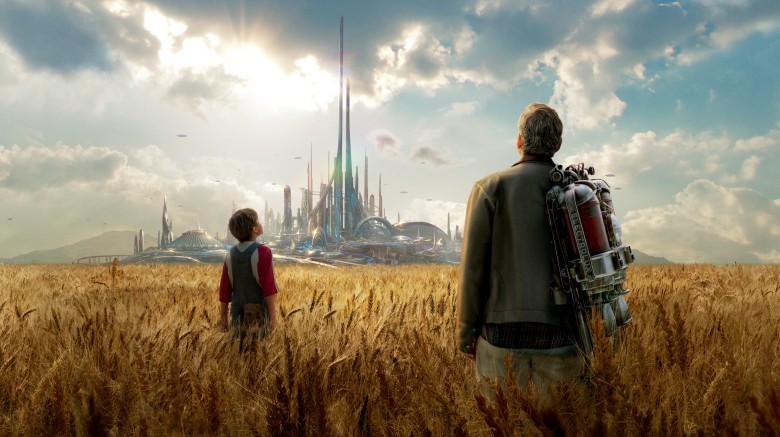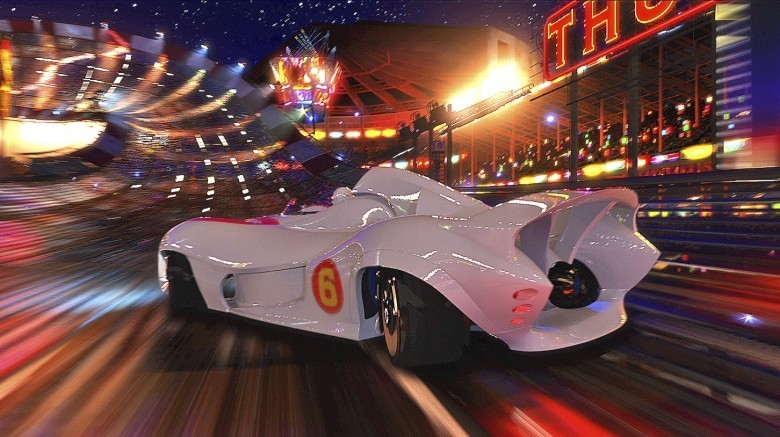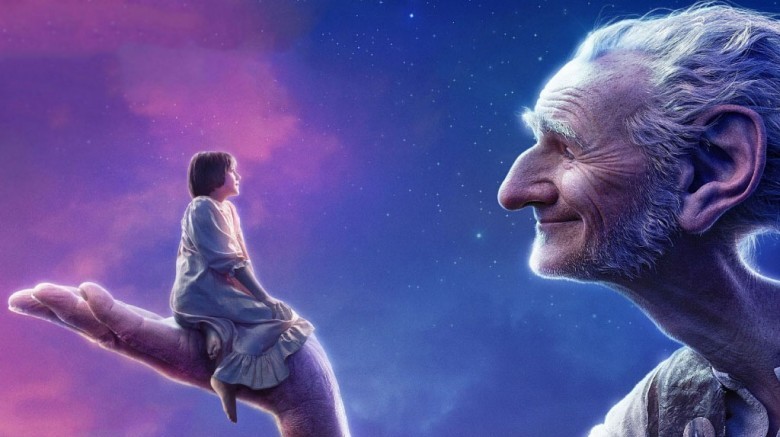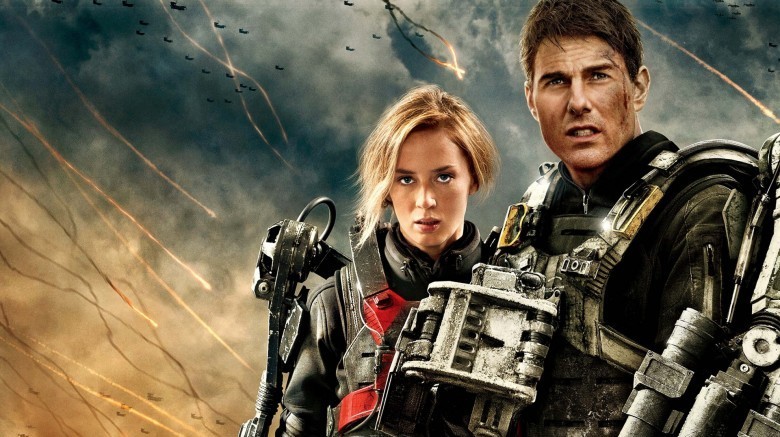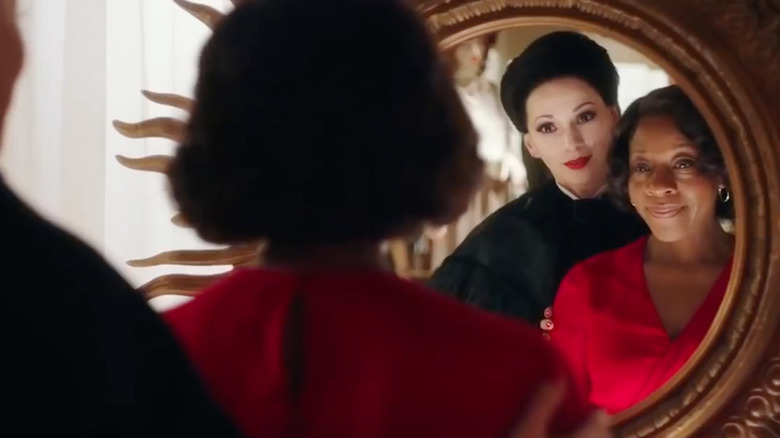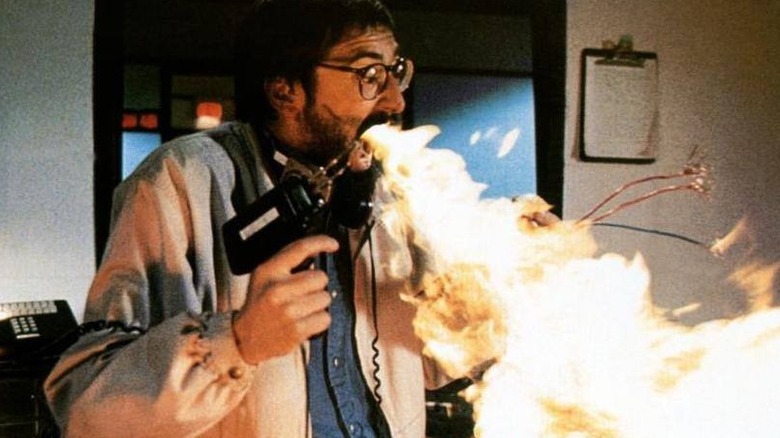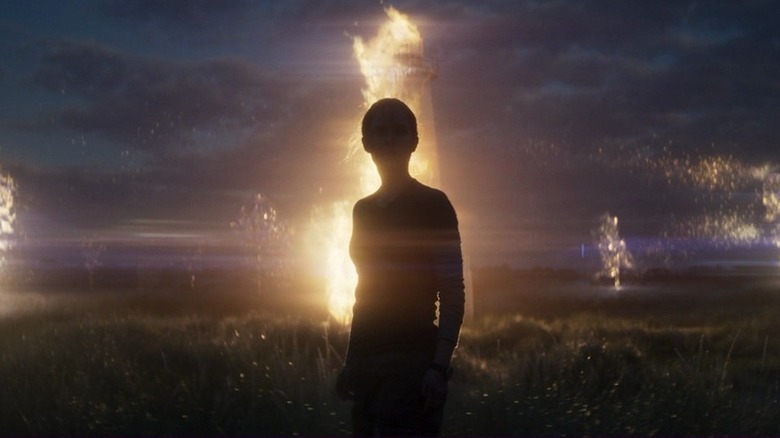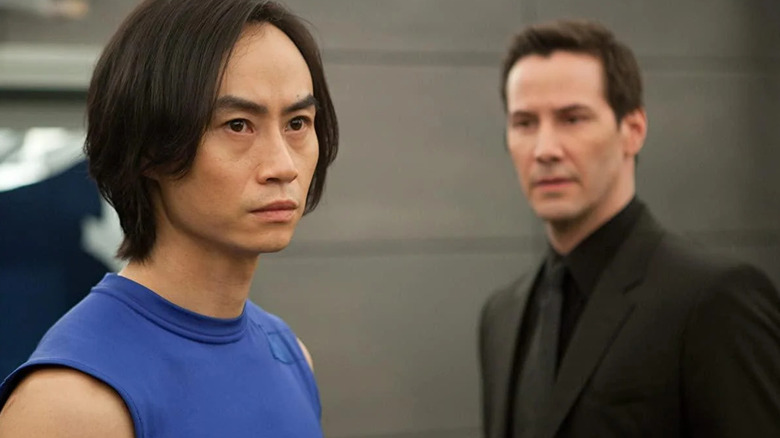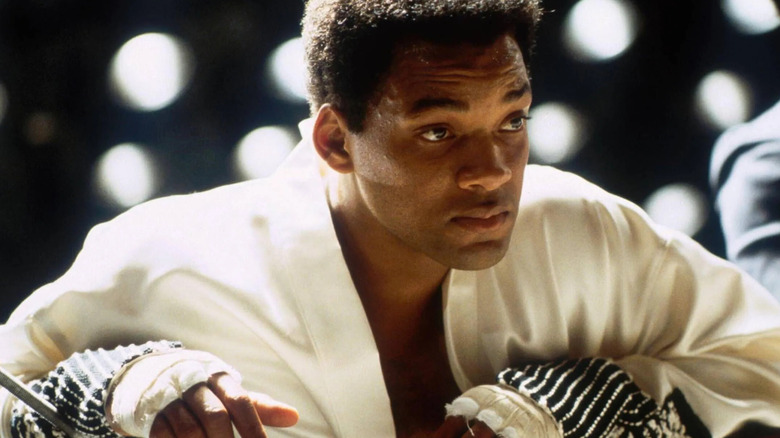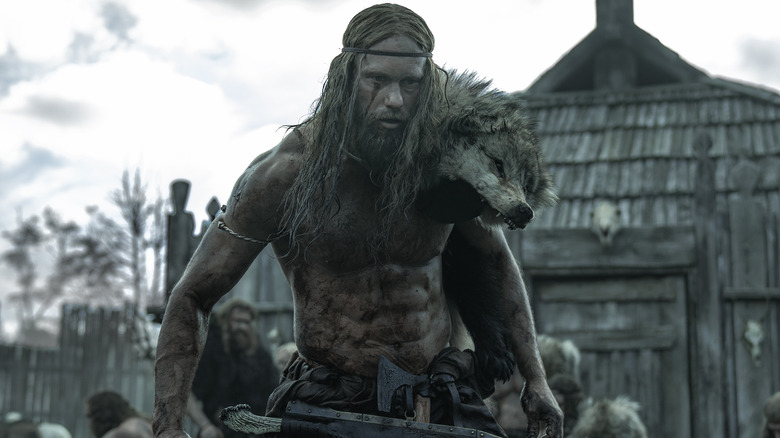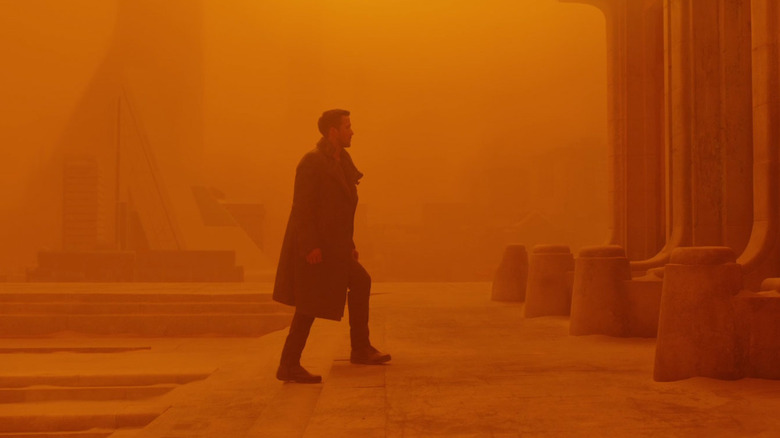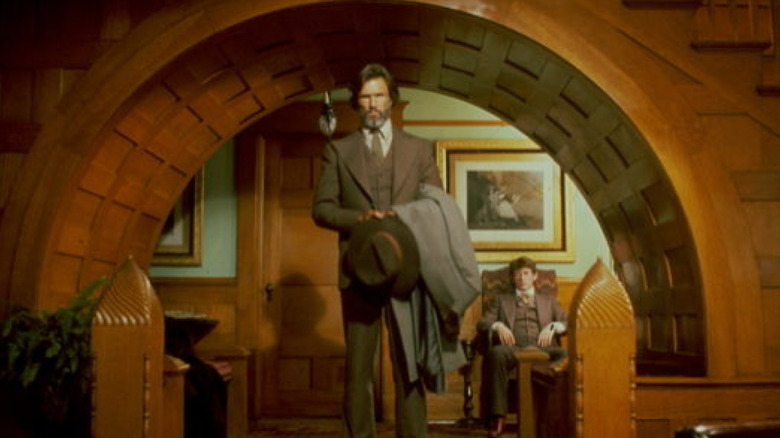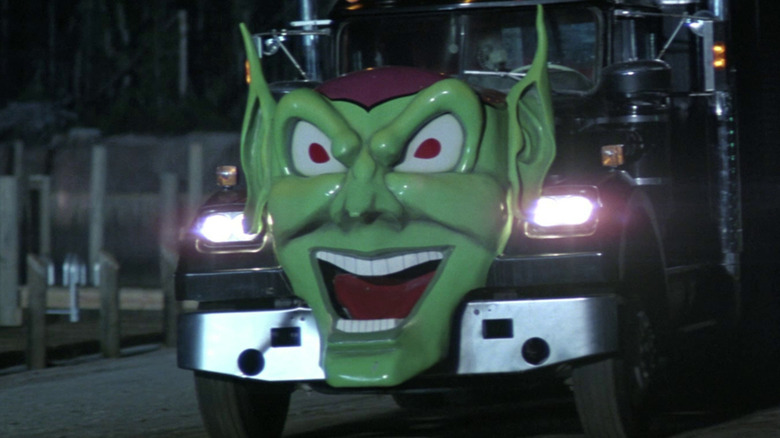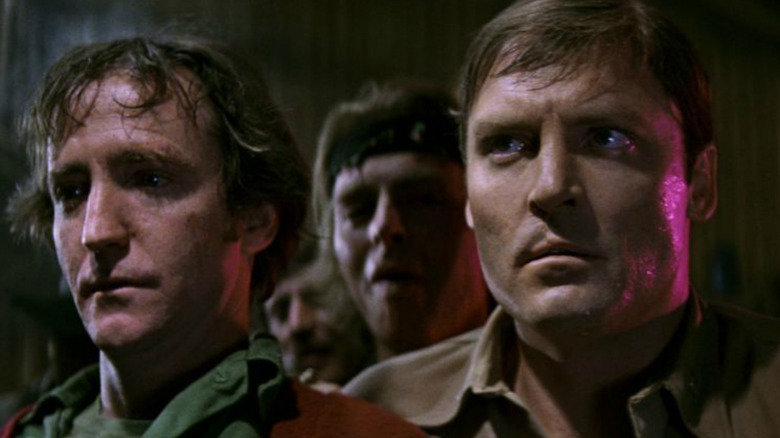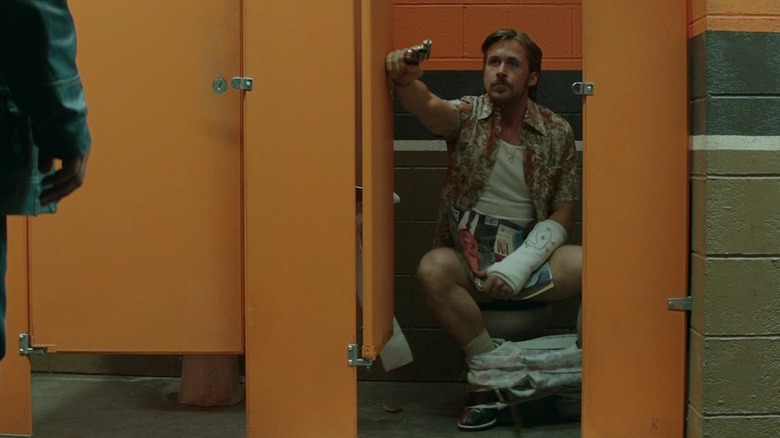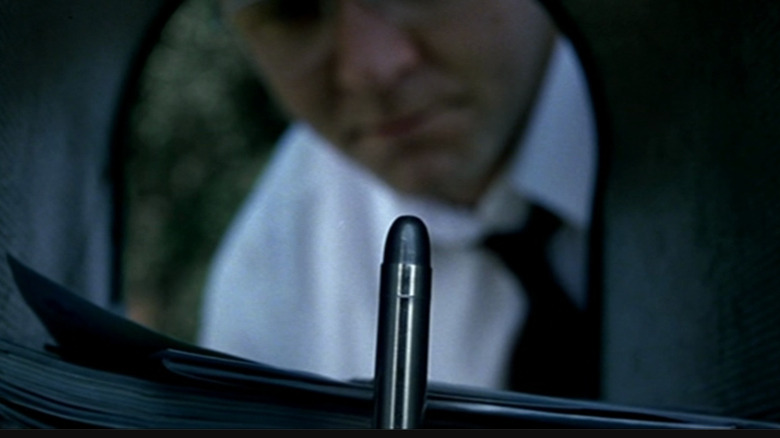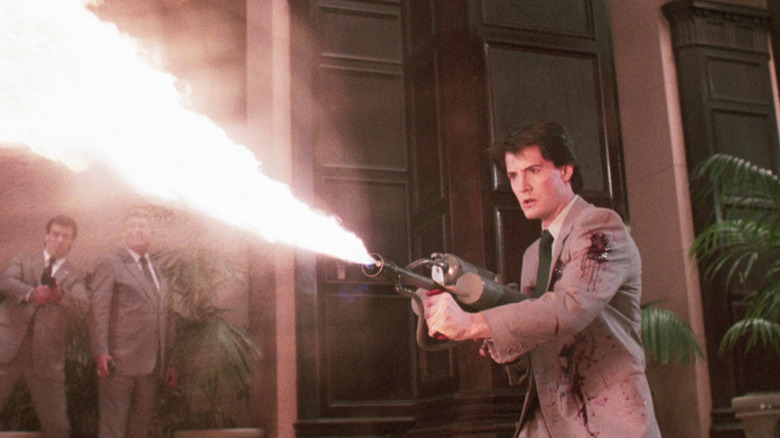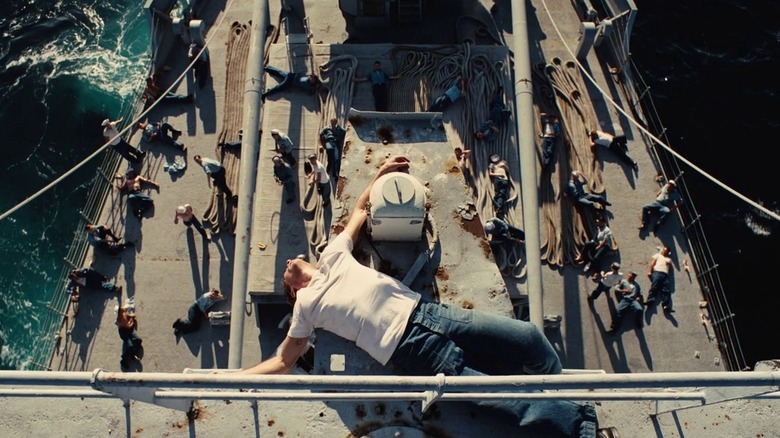Totally Underrated Box Office Flops
The primary index people use to justify a movie's success is often the amount of money it earns at the worldwide box office, and that's understandable. After all, if one movie earned more than another, that means more people saw that movie, and therefore it should be better, right? Well, that isn't always true. Sometimes, truly terrific films flop hard at the box office, and these are just a few of the more perplexing examples.
Dredd
Comic book movies are all the rage in Hollywood these days, with superheroes dominating both the news streams and the box office. But even now, not all comic book movies are as successful as people might think. Take, for example, Pete Travis' "Dredd," based on the character Judge Dredd from the "2000 AD" anthology comics. Though it received favorable reviews from critics, "Dredd" only grossed $35.6 million against a production budget of $50 million.
Rather than grounding the story in some form of acceptable reality, "Dredd" fully embraces its comic book roots and all their attendant absurdity, including the brutal violence. Like all comic book adaptations, Travis' film takes some liberties with the source material, but there's no denying it captures the atmosphere of the comics pretty well. What's more is that all the violence, all the pursuits, and all the grittiness play out like poetry. Plus, the movie features a motorcycle chase scene that rivals "The Matrix Reloaded" and "The Fifth Element."
Even though the movie came out just a few years ago, it's already developed a substantial cult following, and fans continue to campaign for a sequel. Unfortunately, Lionsgate doesn't seem to be on board with another "Dredd" movie, but Netflix seems interested in potentially continuing Judge Dredd's story on the small screen, with Karl Urban returning in the title role.
Zodiac
The mystery of the Zodiac Killer remains unsolved even after all these years. In the late '60s and early '70s, the serial killer murdered five people and injured another two — at least, that's what we know — while taunting police with coded messages. It's believed that he killed another two dozen men and women, though that was never confirmed. It's a mystery thriller that's arguably as intriguing and perplexing as Jack the Ripper, which is why so many people have tried to dramatize the story — including David Fincher, who adapted Robert Graysmith's crime book "Zodiac" for the big screen in 2007.
Laying out an extensive, in-depth case like the Zodiac's for a general audience is difficult, but if anyone was up to the task, it was Fincher. His résumé proves his capability for directing tangled narratives, and "Zodiac" doesn't disappoint on that front — it's a compelling retelling of not only the murders, but also of the manhunt. Couple that with a stellar cast that included Robert Downey Jr., Mark Ruffalo, Jake Gyllenhaal, Brian Cox, and John Carroll Lynch, and you've got the makings of a gripping drama.
Unfortunately, despite having a great cast, a great director, and decent reviews, the film grossed a mere $84.8 million against a production budget of $65 million. However, just because its theatrical grosses proved underwhelming, that doesn't mean it wasn't a success on home video: since it was released on DVD and Blu-ray, "Zodiac" has garnered another $20 million, thus pushing its total gross over $100 million.
Hugo
A director responsible for hard R-rated films like "Goodfellas," "The Departed," and "The Wolf of Wall Street" isn't exactly someone you'd expect to direct a PG movie like "Hugo," but it happened. Martin Scorsese is known for the exceptional use of violence and profanity in his movies, but he took a break from all that in 2011, with his dramatic adventure film "Hugo," starring Asa Butterfield, Chloe Grace Moretz, Ben Kingsley, Sacha Baron Cohen, and Christopher Lee.
"Hugo" received stellar reviews from critics, with Rotten Tomatoes' consensus reading: "'Hugo' is an extravagant, elegant fantasy with an innocence lacking in many modern kids' movies, and one that emanates an unabashed love for the magic of cinema." Unfortunately, the reviews, along with a stellar cast, couldn't propel the movie into box office success. It grossed $185.8 million worldwide against an estimated production budget of $150-$170 million. With a budget like that, "Hugo" should've arrived in the summer, but it instead showed up around Thanksgiving 2011.
Although "Hugo" failed to achieve box office glory, it's still a brilliant film and a rare look into the rise of automation in the early 20th century. Scorsese blended steampunk elements into a historical film with a Parisian backdrop—a combination of things seldom seen in Hollywood, and something people tend to forget about the earliest stages of filmmaking. Though a 21st century film, "Hugo" resembles "A Trip to the Moon" and "The Impossible Voyage" more than it does modern superhero flicks — and that's what makes it beautiful.
The Assassination of Jesse James by the Coward Robert Ford
Jesse James is one of the most famous outlaws in American history, and his assassination by his fellow gang member Robert Ford is possibly just as notorious as the outlaws themselves. Andrew Dominik set out to tell the tale of the duo and their relationship leading up to the momentous murder in his film "The Assassination of Jesse James by the Coward Robert Ford," based on the novel of the same name by Ron Hansen.
Aside from satisfying performances from Brad Pitt and Casey Affleck as Jesse James and Robert Ford, respectively, the film stands out for its exceptional cinematography — all thanks to the legendary Roger Deakins. If you're not up for watching the entire film to get an understanding of what we're talking about, then all you need to see is the brilliant train robber scene. It exemplifies cinematography, as well as proving once more that filmmaking is an actual art form.
For everything the film has going for it — a stellar cast, an outstanding soundtrack, wonderful visuals, and masterful directing — it failed to gross more than half of its production budget of $30 million. Still, it remains a recent critical darling; in fact, some scribes even consider it to be among the greatest Westerns ever made.
The Road
After "The Lord of the Rings" concluded, Viggo Mortensen went back to starring in smaller-scale movies like "A History of Violence" and "Eastern Promises." He's been nominated for several awards over the years, including best actor at the Oscars, but one of his best performances came in service of one of the most underrated films in recent history: "The Road," directed by John Hillcoat and based on the novel of the same name by Cormac McCarthy. Released in 2009, it grossed a mere $27.6 million against a $25 million production budget. But the fact that the film made it out at all is a miracle — anyone who's read a McCarthy novel knows how difficult they are to translate onto the silver screen.
How do you show audiences that the film they're watching is set in a post-apocalyptic world? Simple, make everything gray. Hillcoat and cinematographer Javier Aguirresarobe took that unwritten rule to heart with "The Road," but they did so in a way that complimented the story. There's never been a more haunting representation of a post-apocalyptic world, and that's why the film is so important to the genre. It isn't about why the world is the way it is, or the spectacle that comes with most dystopian movies. Rather, it's about the father-son relationship of the main characters, which is only augmented by extraordinary performances from Mortensen and Kodi Smit-McPhee.
Master and Commander: The Far Side of the World
War movies are fairly common in Hollywood, especially during wartime. Period war epics, on the other hand, are rare. "Braveheart" was the big one in the '90s, and Peter Weir's "Master and Commander: The Far Side of the World," based on the novel of the same name by Patrick O'Brian, was meant to be the big one in the '00s. Unfortunately for Russell Crowe, who starred in the oft-forgotten film, "Master and Commander" was released the same year as Gore Verbinski's "The Pirates of the Caribbean: The Curse of the Black Pearl," which introduced Johnny Depp's Captain Jack Sparrow to the world. At that point, there likely weren't many people lining up to see Crowe take the high seas.
"Master and Commander" is a feast for the eyes, and well worth watching for anyone remotely interested in the Napoleon era. It depicts an often-forgotten period of European history, and it does so remarkably well. Unlike many other historical dramas, "Master and Commander" gets the real-life details mostly right, and Crowe brings it all home with his exceptional performance. The fact that the film received a whopping 10 Oscar nominations (of which it won two) underscores its excellence, as well as how underappreciated it really is. Legendary film critic Roger Ebert gave the film a perfect score, saying "it achieves the epic without losing sight of the human." Crowe knew how underrated his film was, and in 2010, he asked fans to join him in campaigning for a sequel.
Tomorrowland
Disney is known for their animated classics, but when it comes to original live-action movies, things don't always go their way. They endeavored to change that in 2015 with Brad Bird's "Tomorrowland," named after the area inside Disneyland and based on a script by Damon Lindelof.
"Tomorrowland" is a sci-fi lover's dream come true. It has alternate dimensions, futuristic equipment, and subliminal cyberpunk themes, and it's all brought to life with a visual style only Bird can achieve, all wrapped up in a spirited adventure with a moral message about saving the planet and preserving our future. Despite all that (and a prime release date), it managed to gross just over $200 million worldwide — which would be great if its production budget wasn't almost $200 million itself. Ultimately, the only thing "Tomorrowland" proved was that live-action sci-fi flicks don't work for the Mouse House, which is why they're no longer producing those types of movies, like "TRON 3."
The entire premise of "Tomorrowland" is built upon ideas Walt Disney himself put forth decades ago. So why the creatives decided to leave the only connections they had to Disney and Disneyland on the cutting-room floor, despite revealing those connections in teasers leading up to the film's release, is a wonder.
Speed Racer
Lana and Lilly Wachowski made a name for themselves by writing and directing "The Matrix" trilogy. When it came time for them to tackle a new project, they chose to bring the classic "Speed Racer" series to life on the big screen. With the Wachowskis at the helm and legendary producers backing the project, it was rather shocking to see "Speed Racer" flop at the box office, grossing $93.9 million on a production budget of $120 million.
Still, "Speed Racer" is considered by many to be an unsung masterpiece. Anyone who's seen a Japanese anime or read a Japanese manga knows how difficult it is for those stories to translate onto Western screens. The Wachowskis' history with "The Matrix" proved they were up to the job, and the result was perfect. The film's visuals were more than enough to turn off critics, but for franchise fans, it was exactly what the film needed to capture the awe of the original anime. What's interesting, though, is that the movie includes themes of politics and corruption, as well as general societal issues, and those themes unfold on a number of levels –yet it never forgets that it's a kids' movie.
"Speed Racer" didn't fall into the trend of gritty re-imaginings that plagued the 2000s; instead, it retains the humor, wittiness, and light-hearted charm the anime series was known for. It's rare to see a true adaptation of a beloved property, but that's exactly what the Wachowskis gave audiences — and they did it against all odds.
The BFG
Steven Spielberg ranks among the greatest living filmmakers, and the fact that he's the highest-grossing director of all time only bolsters his legacy. He's the guy that pioneered the summer blockbuster, after all. But none of that helped "The BFG" gross more than $183.2 million worldwide on an estimated $140 million production budget in 2016. The movie was a recipe for success; it was being directed by Spielberg, produced and distributed by Disney, and it's based on the famed Roald Dahl novel of the same name. So why it failed to break $200 million is a wonder.
Monetary problems aside, "The BFG" is a criminally underrated film. Despite its big budget, fantastical elements, and summer release, it ignores conventional concepts of what a summer blockbuster should be. It has adventurous and comedic elements, yet it isn't really an adventure or a comedy — it's a big-budgeted fantasy without the extravaganza. It's not so much about the spectacle as it is about the journey, and that's where audiences will find themselves captivated by Mark Rylance's outstanding motion-capture performance as well as the irresistible charm of Hollywood newcomer Ruby Barnhill.
Edge of Tomorrow
Trailers get a bad rap for revealing too many plot details. Like, did we really need to know that Doomsday was in "Batman v Superman" before it arrived in theaters? Probably not, but the fact is, trailers can make or break a film. Without a proper marketing strategy that gets butts in seats, movies can fail at the box office –which is what happened to Doug Liman's "Edge of Tomorrow," based on Hiroshi Sakurazaka's novel "All You Need is Kill."
If one were to go solely on the movie's trailers, that person would likely see another generic sci-fi flick, except this time with elements of "Groundhog Day" interjected in the mix. However, what audiences got was actually a sci-fi film that reworked D-Day into a future war against a hive-minded alien race with the ability to reset the day — that is until someone like megastar Tom Cruise comes along and breaks their winning streak. Rather than following similar time-resetting movies, "Edge of Tomorrow" has more in common with a video game, and it uses that similarity to its advantage. Spawn, advance, die, repeat.
Despite being almost universally acclaimed, "Edge of Tomorrow" failed to achieve box office glory. And make no mistake, the bulk of the film's failure hinged on its botched marketing campaign. So many people thought the movie's title was Live. Die. Repeat. that when it was released on home video, Warner Bros. stopped short of officially changing the name to the actual tagline. If that doesn't scream bad marketing, we don't know what does.
In Fabric
"In Fabric" is a 2018 horror film from writer, director Peter Strickland, the same mind behind indie horror movies like "Berberian Sound Studio" and 2022's "Flux Gourmet." Rather than slotting into the current trends of modern horror, "In Fabric" instead looks to the past. The film is styled as an entry into the old Italian Giallo genre of the '60s and '70s and uses that aesthetic to present the bifurcated story of a haunted dress destroying the lives of two different people. "In Fabric" is a reverent tribute to director Dario Argento and his supernatural horror film "Suspiria" in particular. Fans of this semi-forgotten era of Italian horror will find a lot to love in the highly stylized presentation of "In Fabric," including the film's throwback soundtrack composed by the band Cavern of Anti-Matter.
Strickland's three horror films have all greatly impressed critics but have all failed to connect successfully with general audiences in the same way. "In Fabric" became Strickland's most critically acclaimed horror outing to date, but it lacked the reach necessary to impress moviegoers or earn back its budget at the box office. The film was made for the largest budget of Strickland's career but resulted in a measly box office pull of less than $200K worldwide. Perhaps "In Fabric" is simply a bit too weird to resonate with the general public, but horror aficionados are bound to appreciate the commitment to its throwback style if nothing else.
Spontaneous Combustion
"Spontaneous Combustion" is a largely forgotten horror movie from 1989 that languishes in total obscurity today as an unabated failure, but it just might be worthy of reevaluation. The plot follows a man who is essentially a walking nuclear bomb played by Brad Dourif, who had lent his voice to the iconic killer doll Chucky for the first time the previous year. When Dourif's character gets angry, flames erupt from his body and those around him as he embarks on a quest for answers. The plot is a tangled mess that doesn't hold up to any amount of scrutiny, but the movie is extremely entertaining for horror fans who love a schlocky fun time with an explosive lead performance and incredible special effects sequences. Tobe Hooper, the director of "The Texas Chain Saw Massacre" and "Poltergeist," holds the film together even as the script falls apart entirely.
The film was made for a budget of $5.5 million but had the insulting box office result of just $50K before being pulled from theaters and practically vanishing from existence altogether. "Spontaneous Combustion" was the latest in a string of box office failures for Hooper, whose career was in a dire place by the end of the '80s. The film can be quite hard to find these days since it isn't available to stream or rent digitally and physical media copies are pretty rare, but there is plenty of merit to be uncovered if a copy of "Spontaneous Combustion" does work its way into your life.
Annihilation
"Annihilation" is a thought-provoking sci-fi adventure with compelling pockets of horror from writer-director Alex Garland of "Ex Machina" fame and adapted from the novel of the same by author Jeff VanderMeer. The story concerns an exploratory rescue mission into a zone overtaken by a seemingly alien substance dubbed the shimmer, which changes the way biology functions.
Despite being an all-around excellent sci-fi film, "Annihilation" had its chances of success hamstrung before it was even released. The film was the unfortunate subject of one of the most contentious and high-profile public disputes between producers in recent years with David Ellison of Skydance Media wanting to reshoot and dumb down the movie after poor test screenings made him fear the film was too smart for audiences to get. In the end, Garland was able to resist the studio pressure and deliver on his intended vision, but the film's distribution strategy was essentially sabotaged as a consequence. Planned theatrical distribution was exchanged for streaming premieres in most territories, which resulted in an otherwise avoidable failure at the box office.
Man of Tai Chi
"Man of Tai Chi" was the first and so far only film directed by movie star Keanu Reeves. His love for action and martial arts is abundantly apparent as he delivered a remarkably authentic kung fu flick. The film was shot in China and has the bulk of its dialogue spoken in Mandarin and Cantonese. Reeves' direction is full of stylistic throwbacks to the kung fu films of days past, right down to the stylish whip-zooms. Reeves cast himself as the film's main villain, allowing center stage to go to up-and-coming martial arts star Tiger Hu Chen, who Reeves met while he worked as a stuntman on "The Matrix" series. Reeves also brought along "Matrix" stunt coordinator and legendary action director Yuen Woo-Ping, who ensured that "Man of Tai Chi" had excellent fight scenes.
Given that Chinese was so prominent in the film, Reeves' directorial debut was aimed more at the Chinese box office than the U.S. box office, but his star power in both countries could have resulted in a high-grossing hit. Instead, "Man of Tai Chi" struggled to connect with audiences in either country. With a budget of $32 million — which is quite high in the kung fu genre — "Man of Tai Chi" made less than $5 million in China and struggled to pull in even $100K state side. With his directorial debut resulting in a massive financial failure, Reeves has stuck to working in front of the camera ever since and resumed turning up box-office gold.
Ali
Michael Mann's biopic on boxing icon Muhammad Ali is an excellently acted and assembled film. "Ali" is a highlight of the boxing genre and even earned a pair of Academy Awards nods, earning star Will Smith his first nomination, but all of the critical acclaim in the world couldn't make the film turn a profit.
"Ali" didn't actually perform particularly poorly at the domestic or international box offices. The film brought in almost $90 million worldwide, which could have been considered a success if "Ali" hadn't been so exorbitantly expensive. The film went into production with an already overinflated budget of $107 million, but Mann ended up going significantly over budget even before making the freewheeling decision to extend the shoot and relocate filming to Africa, which incurred additional expenses of up $16 million. To make matters worse, Sony pumped even more marketing dollars behind the film than usual to try to make it a hit, but they just ended up digging themselves into a deeper financial hole. It is believed that Sony's total losses on the film surpassed $100 million by the time all was said and done, making "Ali" one of the all-time box-office disasters.
The Northman
Writer-director Robert Eggers put himself on the map with his 2015 feature directorial debut "The VVitch." This slow-burn horror film turned a tiny budget of $3.5 million into a surprise box office hit with a worldwide return of over $40 million. His next film, "The Lighthouse," was made for a similarly small budget and again managed to turn a profit. The pattern changed for the worse with Eggers' third film, "The Northman."
"The Northman" carries over the grungy period-piece nature of Eggers' previous films while drastically increasing the scope of the story and world. The film is a Viking epic with a flair for the supernatural that certainly has far more mainstream appeal than "The VVitch" or "The Lighthouse" but proved to still be a bit too arthouse for the general public. "The Northman" earned just shy of $35 million at the domestic box office and was a huge disappointment for Universal Pictures and co, who gave the production a massive $90 million budget. To make the situation even tougher, it is believed that $200 million was the true figure the film needed to hit in order to avoid being a financial loss after the costs of marketing and international distribution were squared away.
When Eggers spoke to The Daily Beast about the film's poor box office performance, he said, "I need to restrategize in terms of what I'm pitching to a studio." He added that he would continue to resist taking the tentpole blockbuster route and stay true to himself one way or another in spite of marketability concerns.
Blade Runner 2049
In 2017, the long-belated follow-up to Ridley Scott's sci-fi classic "Blade Runner" from 35 years earlier, "Blade Runner 2049" finally emerged. Crafting a follow-up to such a beloved film was bound to be a challenge no matter what, but if anyone was up to the task, it was director Denis Villeneuve. Hot off the heels of a sci-fi hit with the Oscar-winning "Arrival" released the previous year, Villeneuve delivered a drastically different flavor of science fiction that's as thematically compelling as it is visually stunning.
"Blade Runner 2049" wound up outperforming "Arrival" at the Oscars and was extremely well-received by critics and audiences alike, with some even preferring it over the original. However, for all of the critical success and accolades, the film underperformed significantly at the box office during its theatrical run. With a production budget of $150 million and another $130 million or more spent on marketing, "Blade Runner 2049" needed to be a mega smash hit to avoid becoming a bomb. In the international market, the film came up short, and in the domestic market, it came up extremely short, only making back around half of its total expenditure.
Heaven's Gate
For many years, 1980's "Heaven's Gate" was the poster child for a big-budget box-office bomb. After winning the best director and best picture Academy Awards for his magnum opus "The Deer Hunter," Michael Cimino made "Heaven's Gate" as his direct follow-up. He sadly went straight from being the toast of the town to completely destroying his career.
"Heaven's Gate" is a Western epic about the frontier, immigration, and the Johnson County War of the late 1800s. With a gargantuan runtime of almost four hours, the overstuffed film was widely panned upon its initial release. The film even earned five Razzie nominations and a worst director win for Cimino in the anti-awards show's second-ever installment.
Over the years, "Heaven's Gate" has been re-evaluated as a minor masterpiece and has even been inducted into the Criterion Collection, but all of the critical praise for "Heaven's Gate" arrived far too late to save it from being one of the biggest box-office bombs of all time. The film was originally set for a budget of $7.8 million, but the disastrous shoot skyrocketed the production costs all the way up to $44 million. And that's without even getting into the additional millions spent on marketing, the hundreds of thousands of dollars spent on releasing the film in theaters not once but twice, and the as much as an additional $10 million spent on reshooting and reediting the film down from almost four hours to two-and-a-half hours in length. Adjusted for inflation, the total costs of "Heaven's Gate" topped out in the ballpark of $220 million, but the film brought in less than $3.5 million total at the box office even after two separate theatrical releases.
Maximum Overdrive
"Maximum Overdrive" is an exceptionally strange piece of work, not least of all because it's the only movie ever directed by author Stephen King. Dozens of films have been adapted from King's writings, but this 1986 action-horror hybrid adapted from his short story "Trucks" is the only one he decided to helm himself. He would later admit to being "coked out of his mind" throughout the shoot, which undoubtedly factored into the movie turning out as weird and messy as it did. With a $10 million production budget, "Maximum Overdrive" only earned back just shy of $7.5 million at the box office. King continued writing and occasionally producing but never tried his hand at directing again.
Despite all of the critical derision, box-office failure, and Razzie awards nominations for King and star Emilio Estevez, "Maximum Overdrive" is an exceptionally fun flick if you go in with the right schlocky, over-the-top mindset and view it as a sort of so-bad-it's-good movie. The plot revolving around everything electrical coming to life is fast-paced and packed with non-stop action, creative death scenes, demolition-derby-style vehicular carnage, and too many massive explosions to count, all scored by a rocking all-AC/DC soundtrack.
The Ninth Configuration
Released in 1980, "The Ninth Configuration" was the directorial debut of William Peter Blatty, the author and screenwriter of "The Exorcist." Just like that earlier smash hit, "The Ninth Configuration" was adapted from one of Blatty's novels, but unlike "The Exorcist," the film was a complete failure at the box office and has been condemned to relative obscurity in the modern day.
The story is set in an insane asylum run out of a converted Gothic castle. Stacey Keach stars as Kane, a military psychiatrist who attempts unorthodox therapy on the various inmates, who all belong to branches of U.S. government organizations. Scott Wilson stars opposite Keach as an astronaut who had a mental breakdown in the moments before he was sent into space. The character is the same astronaut who appears briefly in "The Exorcist," where the possessed Regan tells him that he's going to "die up there." What sounds like the setup to another horror film is actually a darkly funny drama filled with thought-provoking commentary on the nature of religion and humanity.
Warner Bros. was initially attached to distribute the film, but after finding disastrous results with a limited test release, the studio canceled the planned nation-wide theatrical rollout. The scrapped distribution meant that the film's box office earnings were virtually non-existent, and Blatty's directorial debut never had a real chance to connect with audiences. Blatty only ever directed one other film — "The Exorcist III," which is excellent and considered a financial disappointment, quite like "The Ninth Configuration."
The Nice Guys
Though he was one of Hollywood's top screenwriters since penning "Lethal Weapon" in 1987, Shane Black didn't make his directorial debut until 2005 with "Kiss Kiss Bang Bang." That hilarious noir-flavored comedy with little bursts of action proved that Black knew what he was doing behind the camera. After directing "Iron Man 3," Black returned with another noir-action-comedy hybrid in 2016 with "The Nice Guys."
With a witty and clever script, a fun '70s LA setting, creative action sequences, and excellent chemistry between stars Russell Crowe and Ryan Gosling, "The Nice Guys" is easy to love. What wasn't easy, on the other hand, was making back its $50 million budget at the box office. Though much larger audiences eventually came around to the film after the fact, "The Nice Guys" only brought in $36 million domestically, a cavernous drop-off from Black's over $1.2 billion-earning MCU endeavor. Black returned to franchise filmmaking with his next outing in the form of "The Predator," but again failed to make back the film's budget at the domestic box office in the wake of terrible reviews for the first time in his directorial career.
The Insider
Released in 1999, "The Insider" is a fantastic drama about journalism, the big tobacco cancer scandal, and the suppression of information through corporate and extralegal means. The film stands tall as one of the best of director, producer, and co-writer Michael Mann's incredibly impressive filmography and received a staggering seven Academy Award nominations, including best picture and best director nods for Mann. All of these strengths coupled with the star power of Al Pacino and Russell Crowe in the two lead roles makes "The Insider" seem like it should be a shoo-in for financial success as well, but the film came up short in that one key metric.
If "The Insider" had been made for a smaller budget, the audience turnout would have been fine or even favorable. The film was made for the overinflated budget of $90 million and only managed to bring in about $26 million upon its initial release. After "The Insider" received a profile boost from its Oscar nominations, the film was re-released in theaters nationwide for the second time, but it only made about half a million dollars on its second go around. The international box office helped soften the financial blow a little bit, but the film was still a major bomb. When Mann's next film, "Ali," was another Oscar nominee but an even bigger box office failure, his budgets began getting smaller.
The Hidden
"The Hidden" is a wild 1987 sci-fi-action-horror movie from director Jack Sholder, who was fresh off of making "A Nightmare on Elm Street 2: Freddy's Revenge" at the time. With an over-the-top plot about killer aliens who love loud music and fast cars, blasts of explosive action, and a committed Kyle MacLachlan starring as an eccentric FBI agent shortly before taking on his most iconic role as FBI Special Agent Dale Cooper on "Twin Peaks," "The Hidden" has a litany of strengths to recommend it and is a real hidden gem of the sci-fi and horror genres.
Sadly, the film's terrible box office performance condemned it to obscurity. With wall-to-wall special effects, "The Hidden" is a more expensive-looking movie than the average '80s horror fare, but it grossed under $10 million domestically. To add insult to injury, the film's attempt to find an overseas audience was about as much of a disaster as possible with a total international box office result of just $245. That sum seems almost impossibly low, but perhaps audiences simply weren't ready for such an off-the-wall genre fusion.
The Master
"The Master" is one of the best films from acclaimed auteur Paul Thomas Anderson. Stunning cinematography, a challenging and thought-provoking script, and two world-class lead performances from Joaquin Phoenix and Philip Seymour Hoffman culminate in a piece of work that is routinely hailed as one of the best films of its decade if not the outright best. With such high prestige surrounding "The Master," it is easy to forget that it was considered a 2012 box-office bomb upon release.
Studio concerns over the financial prospects of "The Master" started mounting before the film even hit theaters. It was once meant to be handled by Universal Pictures, but they dropped it out of fear that it wouldn't be possible to turn a profit on the arthouse drama with its budget set at $35 million. Universal wound up being even more right than they realized. The film's final budget eventually ballooned all the way to $42 million, with the additional costs mostly stemming from Anderson's decision to shoot parts of "The Master" in 65 millimeter and exhibit the finished film in 70 millimeter. The box office pull was only $16 million in the U.S. after a somewhat fumbled expansion from limited release to wide release, and the international box office only contributed another $11 million, leaving the film significantly short of making back its budget. Even with such overwhelming critical acclaim, Anderson lost the funding that was in place for his next film after the terrible box office results and had to look elsewhere for financing.
